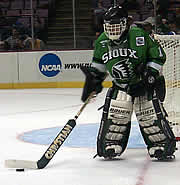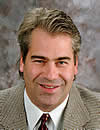Tweaks to the NCAA tournament selection process and other related matters were among the issues discussed at this year’s recently completed American Hockey Coaches Association convention, held in Naples, Fla.
The annual meetings also attract administrators from the conferences themselves, who often hold side meetings with that league’s slate of coaches. The result is a usual assortment of rules proposals, tournament selection tweaks, and off-the-cuff discussion on ways to improve the game of college hockey.
Most significantly was a proposal from ECAC officials to reward teams for winning non-conference road games. The proposal is motivated by the idea that smaller schools find it difficult to schedule bigger schools for home games. ECAC teams, for example, the majority of which can be labeled as “small schools,” wind up playing most of their non-conference games on the road, which can skewer a team’s record and thus their chances for an at-large NCAA bid.
That kind of system is used to one degree or another in basketball and other sports.
“Bigger schools are building big buildings,” said ECAC assistant commissioner Steve Hagwell. “If you’ve got a 14,000-seat facility, it takes money to keep it up and you want to play as many home games as you can. We understand that.
“This isn’t just an ECAC issue. There are other programs [it would benefit]. Not everyone out West has a 14,000-seat arena. It’s trying to make the system better.”
St. Cloud State coach Craig Dahl said more understanding is needed before a judgment can be made.
“I don’t think anyone really understands it well enough,” Dahl said. “Like [Cornell coach] Mike Schafer said, we need to sit down, stick it in a computer and see what would happen. I understand the concept there, but I really don’t understand it well enough to comment intelligently, because I don’t know how basketball does it.”
Jack McDonald, a member of the NCAA Division I Men’s Ice Hockey Committee, said the issue has been discussed among the committee preliminarily, but that he’s not necessarily in favor of adding complexity to a selection process that has finally become widely understood.
“We had the least controversial and most successful tournament [this year],” said McDonald. “We had a regular-season champ [Clarkson] that didn’t go, and with the exception of Potsdam, N.Y., there wasn’t a significant outcry. … It’s really done well. Tweaking and reviewing is healthy. It’s worth looking at, but we’ve got a good thing going.”
Concerns were raised over the issue of placing bye teams for the NCAA tournament. Last summer, the Ice Hockey Committee decided to change the rules regarding byes, so that the teams would be placed irrespective of region. That resulted in three Western teams gaining byes, with one being placed in the second Eastern slot. Normally, that slot would have gone to the next-highest seeded Eastern team.
The coaching membership was split over whether the changes were good, and the issue is likely to be discussed again by the Ice Hockey Committee. Boston University coach Jack Parker was apparently among those more vehmently in favor of awarding byes within region.
“There was no consensus on that,” said Dahl. “It’s all cyclical.”
The issue of improving imperfections in the tournament selection process was informally discussed. For example, how to resolve the issues surrounding insular schedules, and how that can skewer the selection criteria.
There was talk of going back to a 25-50-25 breakdown in figuring the Ratings Percentage Index (RPI), from the 35-50-15 breakdown now which leans more heavily on a team’s winning percentage than their strength of schedule.
“We did it both ways, and there wasn’t much difference,” Dahl said.
Any changes to the tournament selection criteria would have to be approved by the Men’s Division I Ice Hockey Committee. It usually takes under advisement the general sentiment of the coaches, but is not bound to anything but its own votes. The four-member committee will hold its annual meetings in Indianpolis in July.
A recent topic of controversy was also on the agenda: the proposed legislation that would impose a later start date on teams for games and practices. The legislation, advanced by the MAAC against the wishes of the other conferences, recently passed through the NCAA Management Council and will be up for a final vote in October.
Rich Ensor, commissioner of the MAAC, addressed the issue during the convention, and fielded questions and comments from the coaching membership.
“I give a lot of credit to Rich,” said Hagwell. “He came into a no-win situation. Whether he came out positive or not is not for me to say.”
The Management Council actually passed two pieces of legislation, one that moves up the start time for games and practices, and the other that only affects practices.
Despite his appearance in Florida, Ensor remains a controversial figure for what many perceive to be a prevailing attitude of doing what’s best for the MAAC instead of sticking together, as hockey powers traditionally do when it comes to battling the NCAA.
“The MAAC is proposing legislation when they only have four teams that are full-time members,” said Dahl. “Some schools have 11 scholarships, and some have none.
“The concern is that they’re proposing legislation to reduce the length of the season when we already have legislation in place that covers all 132 days. The geographic distance in the WCHA doesn’t always allow you to play mid-week games. They’re new on the scene, and all of a sudden they’re proposing legislation. The general feeling is that they can limit their own season.
“We already have enough to deal with, we already have the recruiting issues with 16-year-olds, recruiting against major juniors. There’s still animosity [towards Ensor].”
McDonald, who is also the athletics director at Quinnipiac, came to Ensor’s defense, and said coaches should be complaining to their Management Council representatives that voted in favor of the legislation.
“As an athletic director, I support a consistent starting date for all sports,” McDonald said. “Now, when that date is … we will get the right date over time. But the way this has been bantered about by coaches, someone is not talking to their NCAA representatives in the Management Council.
“I support Rich Ensor 120 percent. He helped with the amatuerism issue, he will help with bracket expansion. The people most upset are probably the ones that don’t listen to the rule.”
Finally, Dahl said there was discussion about the role of assistant referees. There was particular concern this year that referees from the East and West were calling the game differently in the national tournament.
“Some leagues, they [the ARs] call more than normal,” Dahl said. “We want [refs in all leagues] to stick to the book. They should only call things that the referee does not see [as opposed to calling something the ref saw, but the AR thought deserved a penalty]. We reaffirmed that position.”




